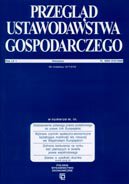Przegląd Ustawodawstwa Gospodarczego nr 12/2013
Rok wydania: 2013
Miejsce wydania: Warszawa
Oprawa: miękka
PRZEGLĄD USTAWODAWSTWA GOSPODARCZEGO 12/2013
Spis treści
Małgorzta Sieradzka, Uczelnia Łazarskiego w Warszawie
The importance of ‘subjective fault’ in fixing pecuniary penalties for competition-restricting practices (Part I)
Streszczenie
Znaczenie „winy subiektywnej” przy nakładaniu kar pieniężnych za stosowanie praktyk ograniczających konkurencję” (cz.I)
Naruszenie zakazu praktyk ograniczających konkurencję wiąże się z sankcjami cywilnoprawnymi oraz administracyjnoprawnymi. Sankcje administracyjnoprawne są określone w ustawie z dnia 16 lutego 2007 r. o ochronie konkurencji i konsumentów i obejmują decyzje o uznaniu praktyki za ograniczającą konkurencję i nakazującą zaniechanie jej stosowania oraz decyzje nakładającą karę pieniężną za złamanie zakazu praktyk ograniczających konkurencję. Zastosowanie sankcji administracyjnych jest uzależnione od spełnienia określonych warunków. W sytuacji złamania zakazu praktyk ograniczających konkurencję Prezes UOKiK wydaje decyzję administracyjną niezależnie od świadomości jego naruszenia po stronie sprawcy. Natomiast warunkiem wydania decyzji o nałożeniu kary pieniężnej za stosowanie praktyk ograniczających konkurencję jest przypisanie sprawcy co najmniej nieumyślności naruszenia zakazu tych praktyk.
Kwestie dotyczące pojęcia winy oraz znaczenia winy subiektywnej przy nakładaniu antymonopolowych zostaną omówione w pierwszej części publikacji. Biorąc pod uwagę fakt, iż w doktrynie prawa antymonopolowego oraz orzecznictwie panuje niekonsekwencja terminologiczna co do rozróżnienia stosunku (nastawienia) sprawcy do zakazu praktyk ograniczających konkurencję, a subiektywnego elementu zawinienia sprawcy (umyślności lub nieumyślności), w drugiej części publikacji dokonano analizy tych pojęć. Przedstawiono również wybrane przykłady orzecznictwa w celu ukazania wagi problemu. Należy mieć na uwadze, iż błędne kwalifikowanie zachowań sprawców naruszenia reguł konkurencji jako nieumyślności wyłącza możliwość podwyższenia kar antymonopolowych.
Grzegorz Materna, Instytut Nauk Prawnych PAN
Zakres podmiotowy zakazu zmów przetargowych w polskim prawie ochrony konkurencji i prawie karnym
Summary
The subjective scope of prohibition of bid-rigging in Polish law on competition`s protection and in criminal law
The article discusses the subjective scope of the prohibition of bid-rigging in Polish law. In Polish legal system bid-rigging is the only category of anticompetitive agreements to which both administrative and criminal liability is applied. Author points to the benefit of such solutions, which is creating legal basis for the liability of both undertakings entering into prohibited agreements as well as specific individuals, acting on behalf of such undertakings. On the other hand, concurrence of the legal basis for liability for bid-rigging may also cause some concerns, such as compliance with the ne bis in idem principle. The author also presents his proposals for the interpretation of Article 305 of the Criminal Code.
Łukasz Jagiełłowicz, Uniwersytet Warszawski
Piotr Szlagowski, Uniwersytet Warszawski
Problem podwójnej reglamentacji działalności gospodarczej w zakresie wydobywania
i magazynowania gazu ziemnego. Uwagi dotyczące relacji pomiędzy ustawą Prawo geologiczne i górnicze a projektowaną ustawą Prawo gazowe
Summary
Double licensing of natural gas production and storage. Remarks on the relation between the Geological and Mining Law and the draft Gas Law
Provisions of the Geological and Mining Law and the draft Gas Law – directly
or indirectly – stipulate that entities willing to commence economic activity in natural gas production or storage are required to obtain licenses based on these two acts. In other words, these entities are required to obtain two separate licenses for the conduct of one and the same economic activity. Such a regulation raises serious concerns as to its compatibility with
the constitutional principle of proportionality of limitations to freedom of economic activities, since it is doubtful that it is necessary in order to fulfill the public interest. Similar objections may be raised not only de lege ferenda, but also de lege lata, in relation to the existing regulation of the natural gas storage which also requires double licensing – based on PGiG and Energy Law. In this paper we first analyze the relationship between scopes of activities that are subject to licensing pursuant to the provisions of the abovementioned legal acts.
Paweł Dudojc, Akademia Leona Koźmińskiego w Warszawie
Odpowiedzialność odszkodowawcza agencji ratingowych
Summary
Liability for damages of credit rating agencies.
In response to the global financial crisis, the countries affected by the economic slowdown have attempted to regulate credit rating agencies into the framework of the legal system. The public consultation carried out by the European Commission pinpointed a number of flaws in the functioning of credit rating agencies. As a result, on 21 May 2013, the European Parliament the Council adopted Regulation (EU) No 462/2013 amending Regulation (EC) No 1060/2009 on credit rating agencies (hereinafter: 3rd Regulation on Credit Rating Agencies), inter alia regulating, among the European Union member states, uniform civil mechanism of pursuing a claim against credit rating agencies. This proposal is an excellent impulse to bring up the issue of the liability of credit rating agencies, signaled in the Polish doctrine. This article analyzes the basic theoretical issues related to the liability of credit rating agencies in contract and tort regime on the basis of existing legislation. In particular, it describes the basic cases of non-performance or improper performance of obligations by the rating agencies, as well as models of events leading to tort damages caused by actions of credit rating agencies. The study examines also the condition of unlawfulness of credit rating agencies operations, describing the fundamental problems associated with the search for a rule of law the breach of which would be the basis for tort liability of credit rating agencies. In addition, the impact of the 3rd Regulation on Credit Rating Agencies on the effectiveness of pursuing civil claims against credit rating agencies in the Polish legal system was a subject of the study presented.
Arbitraż gospodarczy
Marcin Asłanowicz, Dział Procesowy i Arbitrażowy, Baker&McKenzie
Postępowanie o wyłączenie arbitra – analiza spraw toczonych przed Sądem Polubownym (Arbitrażowym) przy Związku Banków Polskich
Spis treści ROK LXVI NR 1-12
| Kurier Inpost | 14 zł |
| Kurier FedEX | 14 zł |
| Inpost Paczkomaty | 14 zł |
| Odbiór osobisty | 0 zł |
| Darmowa dostawa | od 250 zł |
| Darmowa dostawa w Klubie Książki | od 200 zł |


